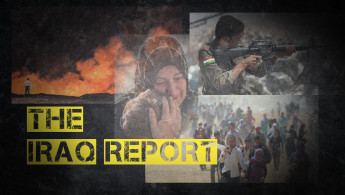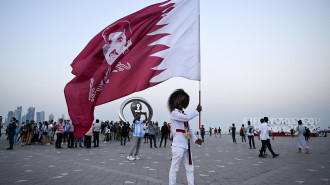The Iraq Report: Sadr and Iran kiss and make up
Click here to receive The Iraq Report each week in your inbox
Muqtada al-Sadr, the Iraqi Shia cleric and last month's election winner, has seemingly gotten over his anti-Iran sentiments and forged an alliance with the election runners-up, the Conquest Alliance, known as Fateh in Arabic.
Fateh is led by commanders of the powerful Shia Islamist militias, who are all from the Hashd al-Sha'abi, or Popular Mobilisation Forces (PMF) and are all closely connected to Iran and the foreign interventionism that Sadr claimed to want to combat.
Together, the two lists control 111 seats, and now need to cut deals with other smaller parties in order to reach a government-forming majority. However, the move will undoubtedly damage Sadr's carefully cultivated image.
Meanwhile, Iraq's political weakness and disunity has allowed for a continuation of its characteristic and defining problem of various militia and extremist factions running amok around the country, and often outside its borders.
The Islamic State militant group has shown signs of vastly increased activity in areas it once ruled over, kidnapping and killing civilians and security officials alike. Simultaneously, Iraqi government-sanctioned paramilitary forces in the PMF have been bombed and killed in airstrikes in Syria, showing that Prime Minister Haider al-Abadi's promise of Iraqi non-interventionism has been shattered by the extraterritorial operations of the PMF.
Sadr forges political alliance
Mutada al-Sadr, the scion of a prominent Shia family and leader of the bloc that won last month's parliamentary election, last week announced an alliance with the PMF-dominated Conquest Alliance, led by controversial Shia Islamist militant Hadi al-Amiri.
In a move packed with religious symbolism, Sadr made the announcement with Amiri at a joint press conference in the Shia holy city of Najaf in Iraq's south. "This move comes from a spirit of patriotism," he said.
The newly formed coalition now controls 111 seats, and is already in talks with other smaller blocs and parties to build the 165-seat majority necessary to form a new government. However, such an arrangement is inherently unstable, due to the ability of one or more parties to abandon the coalition and throw the government into chaos.
Far from being perceived as a patriotic move, however, many Iraqis have heavily criticised Sadr, and accused him of betraying his campaign promise that was exemplified by his supporters who repeatedly chanted "Iran, out, out" during the election campaign.
Al Jazeera Arabic's Iraq editor, Hamid Hadid, posted a tweet suggesting Sadr was a hypocrite, and re-published a document, bearing Sadr's signature and seal, that was widely publicised by the Sadrists soon after Prime Minister Abadi announced that elections would take place.
Twitter Post
|
The document criticised the prime minister for making what turned out to be a short-lived alliance with Fateh.
"Just a reminder that Sadr previously offered his condolences to the Iraqi people… after [Prime Minister] Haider'’s Victory list made an alliance with [PMF commander] Hadi's Fateh list and described it as "hateful sectarianism". Here he is today announcing an alliance with Fateh lead by Hadi," Hadid tweeted in Arabic.
Sadr had sought to portray himself as a non-sectarian and anti-Iran candidate, repeatedly calling on Iraq's eastern neighbour to respect Baghdad's sovereignty and independence. While many media outlets adopted his discourse as genuine, Iraq experts disputed his claims and were quick to point out Sadr's own deep ties to the Iranian regime - and how it was a distinct possibility that he would work with them again.
Sadr's alliance with unabashed Iranian proxies such as Amiri reveals that such analyses were likely justified, and the Shia cleric's pragmatism has enticed him to restore his working relationship with Tehran once more.
IS rampages across former territories
Iraq's political dysfunction and ongoing interference and interventionism emanating primarily from the US, Iran, and Turkey, have allowed for the continuation of a myriad of paramilitary organisations to continue to force their will over the Iraqi people by force of arms.
Most notorious of these is, of course, the Islamic State group who were declared officially defeated by the Iraqi government last December. According to Prime Minister Abadi, IS had been degraded to such a degree that they no longer posed an existential threat to the Iraqi state, and subsequent operations against the extremists would take the form of more traditional intelligence and counterterrorism actions.
While it is certain that IS no longer threatens the territorial integrity of Iraq, that does not mean that it is no longer a highly destabilising force on the ground, especially after several predominantly Sunni Arab cities have been left as little more than piles of rubble by the war against the militant group.
The New Arab’s Arabic language sister site reported on Monday that IS militants had abducted 30 civilians in Salahuddin governorate, and executed seven of the hostages.
The Al-Dor district council chief in Salahuddin, Ali Nawwaf, told a press conference that IS had targeted civilians from the Shimmar tribe, and that the murdered hostages were found the day after they were abducted with their hands tied behind their backs and gunshot wounds to the head.
Nawwaf also warned that IS fighters were active across Salahuddin and Nineveh governorates, particularly the barren desert areas and plains, and called upon federal authorities to intervene and provide security to citizens.
 |
During the war against IS, the PMF were repeatedly accused by international human rights groups of perpetrating anti-Sunni sectarian atrocities and war crimes |  |
In further developments, IS launched a series of attacks over the weekend in and around Mosul, the capital of its now crumbled caliphate. IS assaults on Mosul led to the deaths, wounding and abduction of no fewer than 40 civilians, with an undisclosed number of security forces suffering losses. The attacks have led to a deterioration in Mosul's security situation, with many residents becoming even more fearful after powerful Shia militants from the PMF had been deployed to hunt down the IS militants.
During the war against IS, the PMF were repeatedly accused by international human rights groups of perpetrating anti-Sunni sectarian atrocities and war crimes. Groups including Amnesty International and Human Rights Watch accused the Iraqi government of doing little to safeguard their Sunni citizens, and said that the PMF were using violence against all Sunni Arabs and blaming them for IS terror attacks.
Violence and discrimination against Sunni Arab communities has continued, despite IS' defeat.
Twitter Post
|
Such actions, and the mass destruction of Sunni Arab cities that Hollywood star and UN refugee agency special envoy Angelina Jolie described on Sunday as "the worst devastation I have ever seen", will likely lead to simmering resentment - and that may allow IS to revitalise and rejuvenate itself, risking untold chaos, killings and civil strife.
Iraqi Shia militants killed while fighting for Assad
Apart from its controversial activities inside Iraq, the PMF has been conducting extraterritorial operations in Syria on the side of dictator Bashar al-Assad and in support of Iran's geostrategic aims. These operations have led to many PMF losses, most recently during an airstrike on Sunday night that was first blamed on the United States and then on Israel.
The bombing raid hit the small town of Al-Hari in eastern Syria, near the Iraqi border, and killed at least 22 PMF militants as well as more than 20 other Iran-linked fighters. The town has been controlled by factions linked to Iran's Islamic Revolutionary Guard Corps (IRGC) and has been used as a staging ground and weapons storage depot for operations against IS and other anti-Assad forces.
Both Syrian and Iraqi authorities immediately blamed the US-led coalition, which denied it was involved in the attack.
"US planes fired two guided missiles at a fixed position of Hashd al-Sha'abi units on the border with Syria, killing 22 fighters and wounding 12," a PMF spokesman said immediately following the attack.
However, a US official said "we have reason to believe that it was an Israeli strike". Israel has not issued any statement confirming or denying its involvement in the attack.
Whomever was responsible, the PMF's presence in Syria has been troubling many observers for some time.
Since the PMF was formally recognised as an official arm of the Iraqi armed forces last year, answerable to the prime minister as commander-in-chief, the Iraqi government has made repeated statements pledging to keep its forces engaged inside Iraq only. However, Iraq has launched several airstrikes against IS inside Syria, and the PMF has also repeatedly deployed fighters in support of IRGC missions.
This demonstrates that either Abadi was not telling the entire truth about the extent of Iraqi deployment in Syria, or that his authority over his own armed forces is undermined by the interests of foreign powers who have infiltrated Iraq's security forces and made them tools of their own agendas at Iraq's expense.
Either way, Iraq's internal security and stability will be placed at risk by the military adventurism of the IRGC-linked units.
The Iraq Report is a weekly feature at The New Arab.
Click here to receive The Iraq Report each week in your inbox



